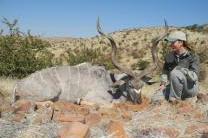Is “trophy” now a lethal adjective for hunting?
I have always believed in the power of words. They have the capacity to inspire us, to lead us to powerful achievements and to great sacrifice. They can carry us to war or encourage us to peace. Weightless and without physical dimension, words remain agile weapons in our search for good and evil, and for truth. Words carry our thoughts. They transport our ideas. They give color, tone, and emphasis to our impressions. We should be careful when we use them and thoughtful when we hear them. We should remember that Adolph Hitler visited untold misery on the world through his rhetorical power. Nelson Mandela did the opposite: His rhetoric dispatched frontiers of gratuitous violence to the cradles of justice and reconciliation. So words really do matter.
None of us who care about hunting and the conservation of wildlife can any longer ignore the influence the word trophy now exerts on public attitudes and activism against hunting. The evidence is everywhere, from public opinion surveys to newspaper and television exposes, to the cackling of social media and the slightly more refined discussions in our halls of political power. Indeed, while many of us have tried to explain how the word is misinterpreted and how, in a real sense, we are all trophy hunters, seeking to acquire mementos or remembrances of our hunting experiences—whether photos, horns, antlers, or capes—it just doesn’t seem to matter. Nor does it seem to matter that many of the world’s most respected conservation organizations such as the World Wildlife Fund and the International Union for the Conservation of Nature support legal, sustainable hunting in many parts of the world because they see the proof of its value in conserving wildlife and supporting human livelihoods.
Sadly, no matter how we try to argue the case, the public worldwide has taken a clear and likely unchangeable position that is negative to trophy hunting. Furthermore, this has now largely become a values-based debate, not a scientific one. No matter how much hunters wish that animal conservation could be the basis of the discussion, it is the behavior of the human beings involved and the very nature of the activity that are under scrutiny. This is the negative power of the word trophy. It has driven people to oppose a significant conservation mechanism.

Since the term “trophy hunting” is so universally misunderstood and disliked by the general public, Mahoney suggests hunters simply stop using it.
Lost to the public’s understanding is the idea that classic trophy hunters pursue only mature animals that have already contributed to the genetic pool of the species, animals that are of an age where death is a pressing reality and likelihood, and animals that because of their physical size and attributes will uniquely attract international hunters and thus provide badly needed income to support local human communities and wider conservation campaigns. Rather, the broad public impression of the trophy hunter is of a wealthy, white male who seeks thrills and self-aggrandizement through the wilful killing of magnificent animals and who cares nothing for wild animals, except that they exist for him to shoot. From this perspective, any benefit to conservation or humanity that may derive from trophy hunting is accidental and not an acceptable reason or rationale.
But the situation is complicated. Meat hunting, for example, is widely supported. Thus a motivational line is drawn between the word meat and the word trophy, even though the vast bulk of all meat from all hunted animals is utilized, including that from most animals harvested by so-called trophy hunters. Frustrating, isn’t it? From this vantage point we begin to see the convoluted world of words in which hunting is now immersed, and we can forecast how difficult it will be to disentangle it. It is now undeniable that communications on hunting will enter a maze of misinterpretation, confusion, and sometimes deliberate distortion that can squander much of our time, money and talent if we are not cautious in how we approach it. Many great intentions have been lost in swamps of exactly this kind. That’s why the hunting community now, more than ever, needs to choose its words carefully.
We desperately need to communicate hunting’s importance. Eliminate trophy hunting from areas such as parts of Africa, and wildlife will suffer and suffer greatly, especially the big, dangerous, and destructive species, the very ones that often plague local communities but that are the darlings of the western conservation conscience. Funny, isn’t it, that people in high-rise condominiums in Brussels or New York want lions and elephants everywhere in Africa but cannot stand so much as a mosquito, cockroach, or mouse in their own domiciles! It is marvelous what wealth and distance can afford. But people who live with wildlife will not accept human fatalities and crop destruction. In the absence of incentives, such as income from guiding hunters and the wild meat provided to them as a result, local people will kill the wildlife around them using whatever means they can.
Regardless of these facts, trophy hunting is unpalatable to a broad section of the modern public in much of Europe and North America. That is the reality we face and must address. In this context, the word modern is also relevant and problematic. Many hunters seem to think the world is the same one we grew up in or believe it can somehow be transformed back to that time, a time when our classic arguments favouring trophy hunting would be an easy sell to the public. Thus we promote the word “trophy” and believe that more statistics and better information will be our silver bullet. Once we present the public with our evidence, we assume people will see the light of day and accept trophy hunting as a reputable undertaking of benefit to both wildlife and people. Unfortunately, that assumption is not necessarily correct.
First, the world really has changed, and second, for as long as we have been conducting public attitude surveys in the North America—forty years or so—a significant majority of the public has perceived trophy hunting as unacceptable. Thus, presenting our arguments on trophy hunting’s benefits to conservation has obviously had little impact for a long time, probably because the public reaction is more against trophy hunting than for wildlife. So why do we think more of the same will work now? This longstanding opposition to trophy hunting also directly challenges the beliefs of those who see Facebook or other modern electronic communication vehicles as the fundamental cause of the public’s reaction to this activity. Even before Facebook inventor Mark Zuckerberg was born, the American public was decidedly against trophy hunting.
Is it possible hunters were part of the problem? Could it be that our messaging, our photos, our magazines, our conventions, our websites, our advertisements, our terminology, our rhetoric, our modern heroes, have all been a significant part of the problem, major influences shaping the public aversion to trophy hunting? I am afraid that simply blaming the Internet will lead us down paths of false hope and useless effort. We can analyze the reasons to death, hold town hall meetings, focus groups, and phone surveys of public attitudes, but the angst over trophy hunting is now a virus in the public conscience, reproducing itself and presenting unlimited variants to us who wish to challenge it. Like a lot of problems in life, it would be nice if the public reaction to trophy hunting could be blamed on one single cause or instrument. Unfortunately, it cannot. The reasons are many and their collective influence is interwoven and complex.
So, is the word trophy now lethal to hunting? I suspect it is, and I believe we should deal with this reality. We should consider a guerrilla tactic for the language war we are engaged in. Let us leave the landscape of the big battle to those who oppose trophy hunting. Let us quietly retire the term trophy, burn the treasured icon they seek, and leave nothing for the marauders to take.
For many in the hunting community, surrendering the term will be difficult and a sign of capitulation. In reality, we give nothing over. We hunt for the reasons we do. No one can take this from us. What the public can take, however, is hunting itself. Let us not lead them there. I see no reason to sacrifice the cultural, economic, and conservation benefits of hunting for an adjective—for as powerful as the term trophy may be for some, it is just a word, isn’t it?
Indeed, while I think of it, why not drop all the hunting adjectives such as meat, trophy, and sport, and simply call it what it is: hunting.










